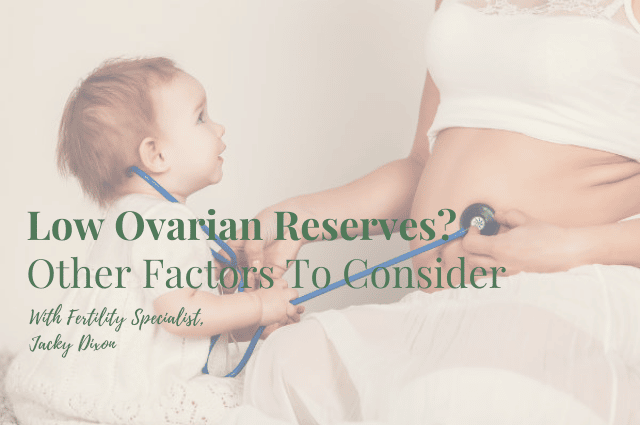
21 Oct Low Ovarian Reserves? Things You Need To Consider
Many women (and men) have already had an appointment with a fertility clinic or started ART (assisted reproductive technology) when they arrive at NatMed.
I endeavour to optimise the chance of success with IVF (ART) by taking a holistic approach to health in all aspects.
Ovulation Overview
Follicle-stimulating hormone (FSH) stimulates the ovaries causing an increase in oestrogen which promotes the growth and maturation of oocytes into mature follicles before ovulation. When follicle maturation is complete, FSH decreases and Luteinizing Hormone (LH) surges, triggering ovulation.
Anti-Mullerian Hormone (AMH) and Ovarian Reserves
Anti-Mullerian Hormone is a protein produced by cells in the ovarian follicles.
I have been disappointed that clinicians put so much emphasis on the results of a few tests – this includes low AMH levels. This biomarker has been used as a ‘gold standard’ to assess ovarian reserves and has been promoted as markers of reproductive potential.
Many women start ART due to the fact that as women age, the oocyte and follicular pool declines.
Research from 2017, published in the Journal of the American Medical Association cited the Association Between Biomarkers of Ovarian Reserve and Infertility Among older Reproductive Age Women. The research was carried out in North Carolina between 2008 and 2016 with a cohort of 750 women in total, age 30-44, who had been trying to conceive for 3 months or less and as research continued it increased to 6 months and then 12 months.
Researchers hypothesised that women with biomarker values suggesting diminished ovarian reserve (low AMH and high FSH) would have a lower probability of conceiving in a given cycle, but the results of the study showed that women attempting to conceive naturally with traditional diminished ovarian reserve markers was not associated with infertility.
Hormone levels fluctuate throughout your cycle and are influenced by many different factors such as:
- The seasons
- Nutrition
- Stress levels
- Excessive exercise
- Not enough exercise
- Travel
- Illness
- Toxin exposure
- Pharmaceutical drugs
- Poor blood flow to the ovaries
- Overweight/underweight
- PCOS
Don’t focus on any one result – if a great emphasis is focused on low AMH results –other factors must be taken into consideration
The Link To Vitamin D
I am constantly surprised that women who should have normal to high vitamin D levels due to diet and good sun exposure have been found to be depleted, and this may lead to a false-positive result for low AMH.
Since I have started preparing genetic reports for clients, I have come to learn the factors affecting vitamin D levels, such as poor transportation, poor conversion from the sun and poor vitamin D receptor efficiency.
Low levels of vitamin D alters AMH signalling, also affecting FSH sensitivity, progesterone production, follicular development and luteinisation
Don’t lose heart if you are told your ovarian reserves are low, there are many other factors involved as it does not give you an idea of the quality of the remaining eggs.
At NatMed we can help you achieve the quality required to support healthy conception and a positive result.
